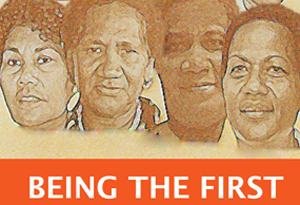
Review: Being the First:
Storis Blong Oloketa Mere lo Solomon Aelen:
Editors: Alice Pollard and Marilyn Waring.
Honiara: RAMSI, Solomon Islands
Don Gibson
SUVA: Laced with culture and tradition, aspects of the South Pacific have always battled with the idea of change. The Solomon Islands has proven to be no exception, and the publishing of Being the First: Storis Blong Oloketa Mere lo Solomon Aelen is testimony to just that.
Featuring 14 accomplished Solomon Islands women, the book explores the many struggles faced by these different women, sexism and job discrimination in particular.
Compiled and edited by Alice Pollard and Marilyn Waring, the women discussed the problems associated with "systems", a word that in the Pacific context proves to be terribly loaded.
Regarded as barrier breakers, the women in this book show an unshakeable tenacity, being contributors to the first book published in 50 years that map the achievements of local women written by local women themselves.
From the likes of Hilda Kari, the only female member of the Solomon Islands Parliament in the post-independence period (1978-2010), to those of local hero, Phyllis Talokwai, these women prove that the wounds created from colonialism can be treated; not through luck, but through determination and acceptance of change.
Constantly acclaimed throughout the book by the other women, Phyllis becomes the initialiser of change as well as the epitome of the successful woman by challenging these systems and taking decision-making rights out of the hands of prejudice.
Through these systems, women were virtually deprived of many if not all forms of labour that included intelligence.
With colonialism came the rule of a foreign culture in the Solomon Islands, and with this ruling came the branding of female duties, the main one being nursing. Females were discouraged from taking part in other communal duties, to the point of them being disallowed into the education system.
With feminists having quite the field day with the text, it was somewhat upsetting to see that the average age of marriage was 21 years, with the exception of Elizabeth. Had Elizabeth not been informed by her New Zealand-based brother that there was no absolute need for her to be married, she would have been married at 18.
Here, readers are forced to examine the extent to which culture affected male as well as female behaviour and their acceptance of gender roles.
Throughout the text, women constantly refer to the roles of males and females because of their exposure to age-old cultural norms.
These cultural mindsets meant that problems such as discrimination and sexism stood out immensely, accentuating the lengths to which the women in the book fought to get to where they are now.
The University of the South Pacific (USP) played a large part in shaping these women, influencing the way in which decisions were made. It was in a less narrow-minded environment that they were pushed to excel in male dominated areas such as Economics and Business Studies.
It was also a time to experiment in terms of balancing workload with relationships, something that according to many of the women was needed to gain exposure before returning home and settling down.
Although culture proved to be a barrier for many women, it also taught them to appreciate religious beliefs.
Religion was key for these women, allowing them time for personal reflection and teaching them to cultivate integrity and composure for such challenging times.
Phyllis Talokwai recalls how she had to battle through systems and systems of cheating people getting to the top of the success ladder without having had any experience. It was at times like these that she remembers turning to her religious beliefs for strength and comfort.
It was obviously a challenge for the featured women to relive some of their toughest moments in life, being subjected to systems of unrewarded labour, unfair dealings and being told that their place was not in the education system.
It is therefore necessary that we salute them for their efforts in re-telling these stories for the benefit of others, to educate and inspire young women and men of this era about determination and necessity in a changing world.
If inspiration is what you are looking for, I recommend Being the First for everything it can provide.
But I definitely think that the book needed much more depth in terms of the women rewriting their actual experiences and it doesnt take a Salman Rushdie to do that.
Take for example, you read something as compelling as Angela's Ashes and then pick up this book hoping that it will be able to allow you to empathise (even a little bit) with these women's situations, but the truth is, their situations are seemingly mundane. If someone's life is boring, why would anyone even attempt to empathise? - Kaila/Fiji Times/Pacific Media Watch



